Living Independently is an article series by the Georgia Council on Developmental Disabilities (GCDD). The series will cover self-determination and self-direction.
Participant self-directed services are growing in popularity as an avenue that can offer an increased autonomy for some individuals with intellectual/developmental disabilities (I/DD). The option offers the flexibility of personally directing services.
“The intrinsic value is that feeling of being able to be in control of your life,” said Ron Wakefield of the state Department of Behavioral Health and Developmental Disabilities (DBHDD).
A 2019 national survey by Applied Self-Direction found 1.2 million people are self-directing, an increase of nearly 17% from 2016.
In Georgia, the number of people self-directing was down 10% during the three-year period. But according to DBHDD, there is robust interest.
Wakefield, director of the Division of Developmental and Intellectual Disabilities, said more than 3,000 individuals currently receive participant self-directed services.
An increasing number of people are hearing about the option from their friends. And while his department staff cannot steer a person or family to self-directed services, they can provide complete information and guidelines, he added.
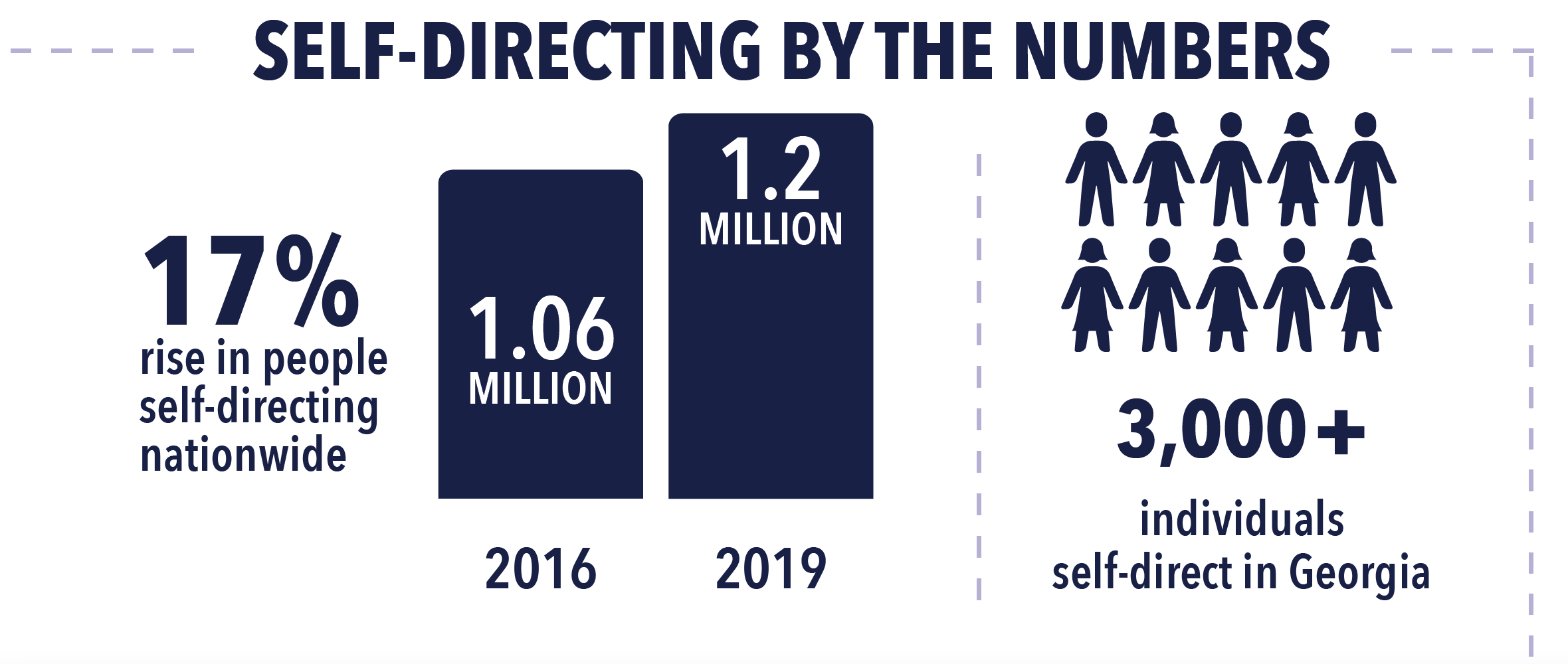
“Our job is to make sure we present [people] with the entire array of services,” he said. “And we have lots of people who come in and say, ‘I don’t want traditional services, I want to self-direct.’”
Participant direction is a delivery option for services in which a person can decide and manage their support. They can hire the necessary staff and vendor companies, manage the budget for those services and even decide on the pay and hours of work.
It differs from traditional delivery of services in which the recipient or their representative select a company that manages services and the budget provided. With traditional delivery services, it’s the company that hires caregivers and support staff and decides on the pay rate and schedule hours.
DBHDD facilitates funding for both traditional and participant-directed methods of services through the New Options and Comprehensive Supports Waiver program of Medicaid, known as the NOW/COMP Waivers.
Services provided through the waivers for people with I/DD can be carried out in the home or the community.
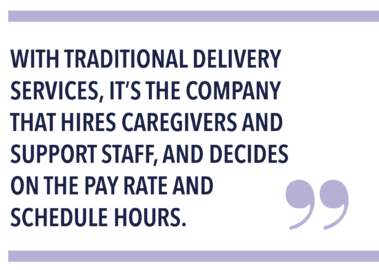 The New Options Waiver is for people who can live independently and would also benefit from support. The Comprehensive Supports Waiver is for people who need a great deal of support at home and out in the community.
The New Options Waiver is for people who can live independently and would also benefit from support. The Comprehensive Supports Waiver is for people who need a great deal of support at home and out in the community.
In Georgia, participant direction is available only to people receiving the NOW/COMP Waiver and who can live independently or with a family member. It is not available to individuals who live in a residential facility, host home or a personal care home.
While a financial support services provider, also called a fiscal intermediary, is required for participant-directed services, Wakefield said there is a lot to teach for those who choose self-directed services.
“They will spend money on certain things in a certain way that may not be approved” he said. “That’s the main concern we have because we don’t want that to happen.”
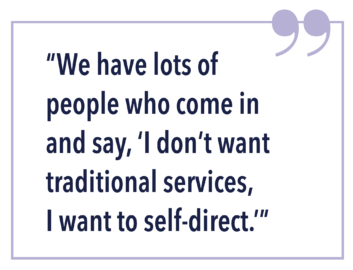 Wakefield added that if officials determine the recipient or representative of self-directed services unknowingly does this, the DBHDD will try to help them resolve and correct the problem with no penalties.
Wakefield added that if officials determine the recipient or representative of self-directed services unknowingly does this, the DBHDD will try to help them resolve and correct the problem with no penalties.
The Division is working to address the issue with training sessions and resources for individuals choosing participant-directed services, as well as their assistants and advocates.
“If someone isn’t fully educated on what it entails, they can literally get themselves into trouble,” Wakefield said. “We find that some people, after training and [starting] the services, don’t follow guidelines and that becomes problematic.”
The Georgia Participant-Direction Advisory Group provides invaluable insight advising the state on issues and needs that arise in families when using the service delivery options.
The advisory group is comprised of volunteers advocating for participants and representatives using self-directed services.
Kate Murray, of Boston-based Applied Self-Direction, said self-directed services date back to the 1970s when healthcare institutions were closing and people receiving services wanted more of a say and control over their lives.
Then in the 1990s, self-direction began to evolve through the work of the Robert Wood Johnson Foundation, she added. Researchers were tracking outcomes for separate groups of individuals receiving self-directed services and traditional services.
“They had good outcomes with self-directing adults with developmental disabilities,” Murray said. “That gave us a mandate to replicate the model. The research was critical for getting full government approval.”
Applied Self-Direction works with states and the federal government to create new self-direction programs and consult on policy. Through membership, the organization provides such states as Georgia expert training and technology on all aspects of self-direction including employment laws and Medicaid rules.
“We work with states and families to help make sure services are high quality and person-centered, and work for the families,” Murray said.
In general, participant-directed programs can vary from state to state.
“We have seen nationally, a much greater uptake of folks who want self-direction,” Murray said. “Especially in wake of the pandemic, to limit exposure.”
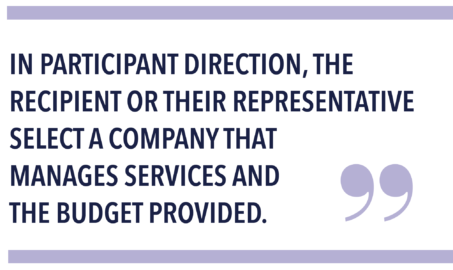 The self-direction advocate said, for example, the state of Maine is in the process of adding self-directed services to their waivers serving people with developmental disabilities. And Maine has already added self-directed services to their waivers serving people with brain injury and certain physical disabilities during the pandemic, Murray said.
The self-direction advocate said, for example, the state of Maine is in the process of adding self-directed services to their waivers serving people with developmental disabilities. And Maine has already added self-directed services to their waivers serving people with brain injury and certain physical disabilities during the pandemic, Murray said.
In Georgia, during the pandemic, Medicaid temporarily relaxed guidelines through a special waiver allowing family members to be caregivers to the person receiving self-directed services.
“Prior to the pandemic you weren’t allowed to hire dad and mom except in certain situations,” Wakefield said. “Families have reached out and asked us to [continue with the new policy]. We are looking at that. We are looking at other states to see what’s possible.”
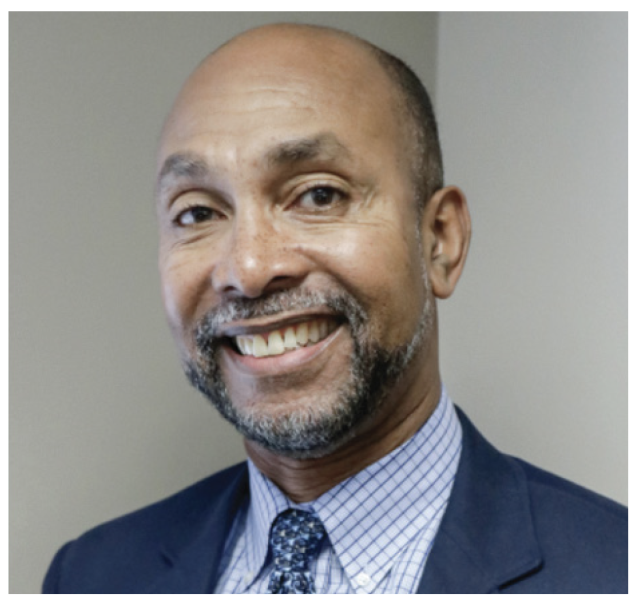
This article includes an interview with Ron Wakefield, director of the state Department of Behavioral Health and Developmental Disabilities’ Division of Developmental and Intellectual Disabilities.
